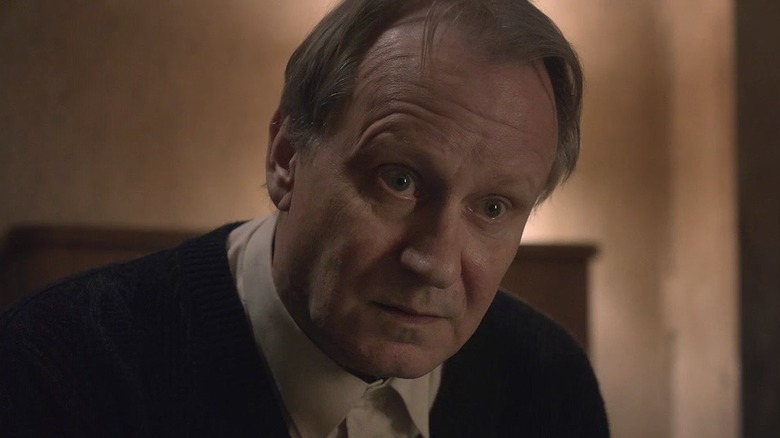Nymphomaniac Ending Explained: The Not-So Little Death
The misanthropic auteur Lars Von Trier is known for making controversial and polarizing films, and his 2013 two-part, four-hour sex epic "Nymphomaniac" is no exception. The film began making waves when a series of "O-Face" posters, depicting the main stars at the peak of orgasm while (tastefully) nude, were released. One Room With a View surmised that "Nymphomaniac" was "the most sexually explicit film in mainstream cinema's history." At first, both volumes of "Nymphomaniac" were rated NC-17, but they were eventually released without any MPAA rating — mostly because they featured unsimulated sex scenes (with body doubles).
Von Trier's erotic odyssey begins when a charming older bachelor named Seligman (Stellan Skarsgård) finds Joe (Charlotte Gainsbourg) beaten up in an alley. He takes her home to care for her, and she recounts the story of her life as a nymphomaniac. Seligman is the perfect person to listen to her without judgement because he is an asexual virgin; his chastity allows him analyze Joe's tales with intelligence and insight, often connecting them to various theoretical ideas.
The highlights of Joe's sexual journey are shown via flashback, from her awakening as a young girl to her crisis when she no longer felt pleasure. Joe grapples with the idea that her nymphomania makes her a bad person, but Seligman assures Joe that her libidinous appetite would not be criticized by society if she were a man. Over the course of four hours, Joe grows comfortable with Seligman and feels free to vent about her inner turmoil and guilt over having an insatiable sexual appetite; she is able to truly bare all with him because he is an impartial listener. This leads to a jaw-dropping ending that upends what we know about one of the characters.
Seligman Completely Changes
Once Joe has finished telling her story, she decides to go to bed. During the night while she sleeps, Seligman creeps back into her room without his pants, sits on the bed, lifts the covers up to reveal Joe's bare bottom, and then starts pleasuring himself in an attempt to rape her. Joe awakens in shock and the film cuts to black as she reaches for her gun.
We hear Seligman trying to justify his actions by saying, "You've had sex with thousands of men," then the piercing sound of a gunshot — presumably killing Seligman — before Joe hurriedly grabs her things and leaves the apartment.
During Joe's lengthy yarn about her life, Seligman was a gentle and thoughtful voice providing an outsider's perspective on some of her worst transgressions. While most of society scorned her, Seligman offered empathy and possible redemption; he made Joe feel safe, and they formed an affectionate relationship that the audience cared about, too. Joe even confesses to Seligman that he is the first true friend she has ever had. The blunt force of the bleak ending is rage-inducing and destroys the relationship Joe and Seligman spent the entire film building. Through the dismal final scene of "Nymphomaniac," Von Trier makes a grand statement about how men are all the same and will always want to take advantage of women.
Lars Von Trier Makes a Cynical Statement About Men
When Seligman reminds Joe that she has "had sex with thousands of men," he references the enduring belief that women who actively have desires and act on them are "sluts." He strips Joe of any agency and just assumes that she will have sex with anyone because she has already had a plethora of partners. Despite listening and relating to her story on an emotional level, Seligman has gleaned nothing but the fact that she has a lengthy sexual history and that gives him the right to take advantage of her. What difference does one more partner make if she has already slept with tons of other men?
The ending of "Nymphomaniac" is surprising, and asserts that men are naturally insidious; it is a cruel punchline to the joke that men are nothing but horny predators who feel entitled to women's bodies. In some ways, the finale echoes an earlier scene where Joe sympathizes with a pedophile when their discussion of children brought up his suppressed feelings. Seligman immersed himself in intellectual pursuits and avoided human contact for so long that hearing such intimate, detailed accounts of Joe's sexual exploits may have piqued his curiosity reignited the sexual longings he buried. The final scene depicts a sexual transference between the two main characters; by the end, Joe renounces her hypersexuality and Seligman adopts it. Ultimately, Seligman is just like any other man and cannot resist his intrinsic carnal needs.
Skarsgård told Slate that he also did not anticipate such an austere ending:
"No, neither did I. And when I read the script, I thought, 'Wow, what a disappointment.' It's really sad, because, first of all, it says that Seligman hasn't quite understood. You think that, during this process, he's learned something, but obviously he hasn't learned enough. So it's sad, but there's also the sense of, 'Oh, Lars. You just don't want to make people feel good.' Of course, you can't have a happy ending, and everything is solved because that would be against his nature. As soon as you think you know what it's all about, then he's got to f*** you. And he does."
The staggering finale reflects Von Trier's fascination with the very worst of humanity and penchant for manipulating audiences. His dour ending comes down like a sledgehammer to annihilate Joe and Seligman's candid and sympathetic dynamic. Seligman's betrayal implies that men have animalistic desires that cannot be controlled, and they are unable to transcend them; it also reminds audiences that even kind-hearted, loving men are capable of rape. Women, on the other hand, are ruthlessly spurned by society. The final scene in "Nymphomaniac" takes a more feminist stance to illustrate how no one has the right to touch a woman that does not want to be touched — regardless of the amount of sexual partners she has had.


